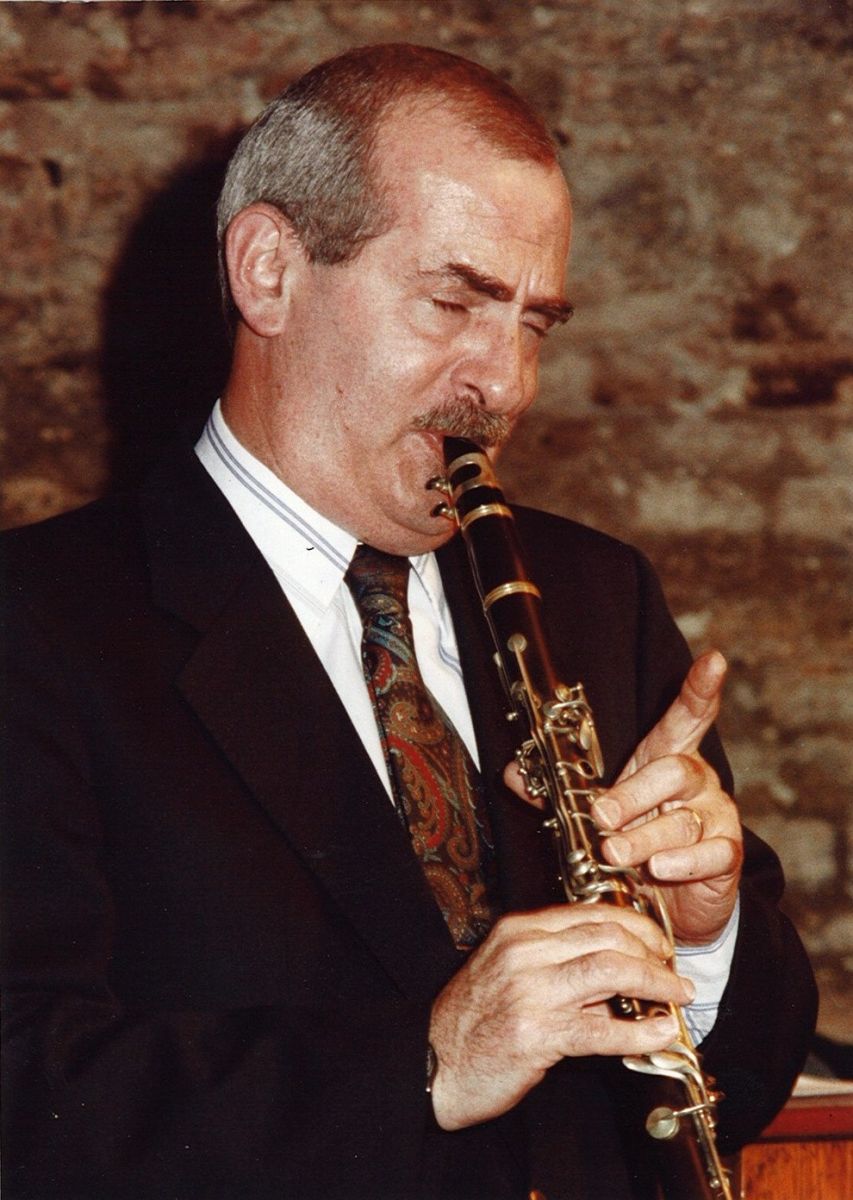
Kenny Davern. Photo courtesy of Riverwalk Jazz.
“You could pick Kenny Davern out on a record after two or three notes —like a hot knife going through butter,” said Warren Vaché, a trumpeter and longtime friend quoted in Davern’s December 2006 obituary in the New York Times. “His playing was edgy and cutting and virile and, at the same time, passionate and tender.”
Clarinet master Kenny Davern was only sixteen when he went down and signed up with the musicians union. Three years later, he was playing in a band led by trombone giant Jack Teagarden. Whether performing in concert halls, on the international festival circuit, or in the recording studio, Davern was always at the heart of the classic jazz world. This edition of Riverwalk Jazz celebrates “Jazz Memories with Kenny Davern,” a program devoted to the great clarinetist’s life in music.
There are few jazzmen with more on the job experience than John Kenneth Davern. In a remarkable career spanning more than fifty years, Kenny has just about done it all. He began his professional music career as a teenager in 1951, performing and recording on New York’s vibrant jazz scene with top jazzmen of the day —many twice his age or more. He worked steadily from then on. Trumpeter Yank Lawson, drummer Gene Krupa, bassist Milt Hinton, pianist Earl Hines, saxophonist Bud Freeman, and clarinetist Pee Wee Russell are among the ‘greats’ the talented young clarinetist joined on stage.
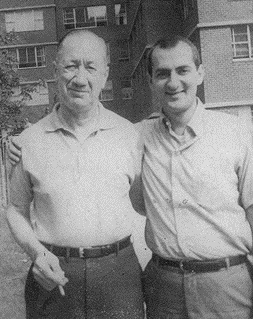
Kenny Davern with Pee Wee Russell, 1961. Photo courtesy of Elsa Davern.
Jazz piano legend Earl Hines called Kenny Davern “the best clarinetist since Jimmie Noone.” A Jazz Journal Reader’s Poll named Davern the “Best Jazz Clarinetist in the World.” New York Times jazz critic John S. Wilson lauded his powerful and original style, as has jazz writer Nat Hentoff. Among the many honors he has received, Kenny Davern been inducted into the Jazz Hall of Fame at Rutgers University.
On this broadcast Jim Cullum says, “Kenny is one of my all-time favorite players, and he’s a key inspirational figure for jazz musicians around the world and for us, too.” To borrow a phrase from Duke Ellington, Kenny’s performance is truly “beyond category.”
In a conversation on this broadcast with co-host David Holt, Kenny Davern talks about his early musical influences and remarks that hearing Pee Wee Russell on the radio for the first time changed his life ‘drastically.’ “I stood there transfixed. I said, ‘What is that?’ Whatever it was, at that age, I knew I wanted to dedicate my life to it.” Davern goes on to say that he first became interested in the clarinet after hearing a recording of Artie Shaw’s Clarinet Concerto.
Talking about another “jazz original”, Kenny says, “Red Allen was the most dynamic musician I ever worked with in my life. He could have an audience of hardened criminals eating out of the palm of his hand within seconds of his arrival into a club.”
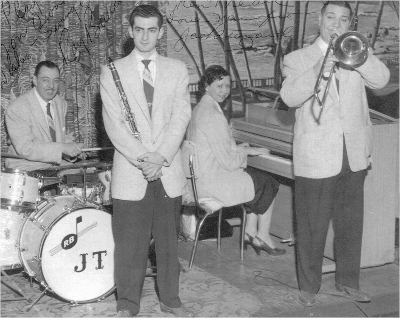
Ray Bauduc, Kenny Davern, Norma Teagarden, Jack Teagarden, circa 1954. Photo courtesy of Elsa Davern.
Getting an invitation to audition for a band led by trombone great Jack Teagarden was Kenny’s first big break in the music business. He was nineteen and had been performing professionally for less than three years. After the audition, Jack didn’t say anything and Kenny was a little nervous but got up his courage and asked Teagarden if he was hired. The great jazzman replied, “Of course, you’re hired. Where have you been all my life?” Three days later, Kenny made his recording debut with the Teagarden ensemble.
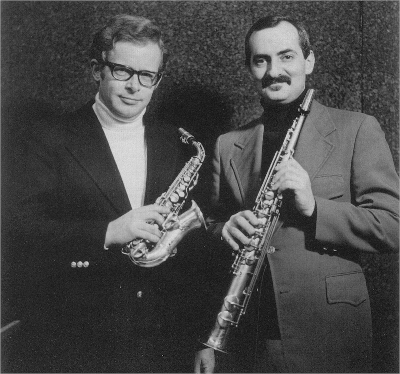
Bob Wilber and Kenny Davern, Soprano Summit publicity photo, 1973. Photo courtesy of Elsa Davern.
As the rock revolution began to dominate popular music in the early 60s, the jazz scene in New York slowed. New opportunities for traditional jazz players popped up in Colorado where entrepreneur Dick Gibson launched his famous ‘jazz parties’ in Denver. These weekend-long parties revitalized the jazz scene, and before long jazz parties cropped up in cities across the country.
A spectacular group to evolve from the jazz party scene in this era was Soprano Summit, with Kenny Davern and Bob Wilber on soprano saxophones. This exciting pairing came about at the suggestion of Dick Gibson towards the end of his 1972 Labor Day Weekend jazz party in Colorado Springs. Soprano Summit went on to record seven distinguished albums of classic jazz before they disbanded in 1979.
Broadcast Concert Playlist
Though all the tunes performed on this broadcast are well-known standards of the traditional jazz canon, they represent a subset of tunes favored by Kenny Davern and often popularized through his celebrated recordings and concert appearances over the decades.
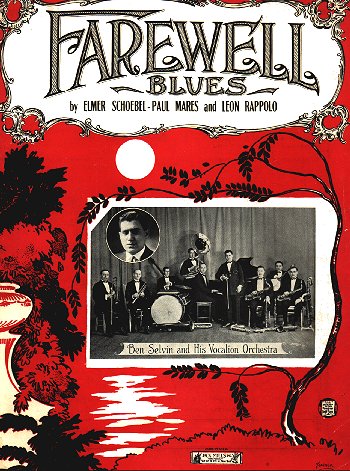
"Farewell Blues" sheet music, 1923. Image in public domain.
“Farewell Blues” a 1923 tune from the New Orleans Rhythm Kings.
“Old Fashioned Love” from 1923 is one of the most popular and enduring tunes composed by James P. Johnson.
“Jazz Me Blues,” a traditional jam session favorite from 1917, is given a high-energy duo clarinet treatment featuring Kenny Davern and Cullum Band clarinetist Ron Hockett. Jim and the Band (with Hockett on tenor saxophone) join Kenny on another jam favorite, “Baby Won't You Please Come Home?”
“My Gal Sal” started out in the early 1900s as a parlor song played in 3/4 waltz time. Working together in Soprano Summit, Davern and reedman Bob Wilber helped transform parlor songs, like this one, into jazz repertoire by giving them a hot, driving 4/4 rhythm.
“Up a Lazy River” by Hoagy Carmichael and Sidney Arodin features Kenny Davern and The Jim Cullum Jazz Band rhythm section.
“How Come You Do Me Like You Do?” features Kenny Davern with the full Cullum band, with Ron Hockett on tenor saxophone.
“Comes Love” is a jazz standard from 1939, often performed and recorded by Davern.
“Diga Diga Doo” by Jimmy McHugh and Dorothy Fields debuted in the 1928 stage revue Blackbirds of 1928 and was later recorded by Duke Ellington and His Cotton Club Orchestra with vocals by the Mills Brothers.
Photo credit for Home Page: Kenny Davern. Photo courtesy lastfm.
Text based on Riverwalk Jazz script by Margaret Moos Pick ©2004

